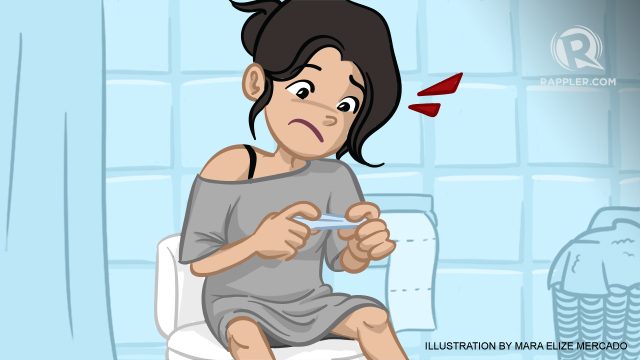SUMMARY
This is AI generated summarization, which may have errors. For context, always refer to the full article.

MANILA, Philippines — Did you know there is such a thing as Menstrual Hygiene (MH) Day?
MH Day is celebrated on May 28th across different parts of the world.
May, the 5th month of the year, represents the average number of days a woman is on her monthly period. And 28 represents the average number of days in a menstrual cycle.
The idea was initiated in 2013 by WASH United, an international social impact organization working on Water, Sanitation, and Hygiene (WASH) issues across Sub-Saharan Africa and Asia.
But why celebrate?
MH Day may sound silly, but it stands for an important yet overlooked issue: Not everyone has access to knowledge and resources to manage their MH, including services as basic as clean water, functioning toilets, sanitary napkins, and disposal systems.
“MH Day offers the opportunity to create awareness of the right of women and girls to hygienically manage their menstruation – in privacy, safety and with dignity – where ever they are,” said WASH United.
Inadequate access to such needs not only impact women’s physical health, but also their “social and mental wellbeing.” (READ: Girls, blood, sex)
Some girls miss school whenever they are on their period due to infections, discomfort, or even shame — since some schools and households do not provide enough information on MH, girls on their period tend to be ridiculed.
And of course, the lack of understanding on menstruation poses a threat to reproductive health. Some are unaware of the link between menstrual cycle and pregnancy, leaving couples clueless on how babies are made. For them, pregnancy remains a hit-and-miss mystery.
Although these issues are mostly experienced in less developed countries where menstruation remains taboo, some Filipino girls actually go through these problems every month.
Menstruation 101
Periods, just like women, are diverse.
Menstrual flow can be light, moderate, or heavy. Some periods are shorter than others. It may come on an exact date every month, but other times, they miss a few days.
In the Philippines, menstruation is seen as a rite for passage for girls. Not everyone, however, understands what is going on with their bodies.
Although men do not experience menstruation, it is also important for them to understand it in order for him and his partner to maintain good reproductive health – which includes their right to “have a satisfying and safe sex life,” and the “capability to reproduce and the freedom to decide if, when and how often to do so.”
Here are some of the most common menstruation myths:

MYTH: Don’t take a bath during your period; otherwise, you’ll experience insanity, infertility, or hair loss.
BUSTED: It’s actually very important for girls to clean their bodies during their period; otherwise, they may develop vaginal infections since blood could serve as a medium for bacteria.

MYTH: When you get your period for the first time, wash your underwear and use it to wipe your skin. This keeps the pimples away.
BUSTED: This ritual has no connection with pimples, however, this may be unsanitary. “Menstrual acne” may also be common in some women. Hormonal shifts during the menstrual cycle can produce more sebum or oily substance in the skin, while also causing pores to compress. The oil can provide “food for bacteria,” hence causing outbreaks or inflammation.

MYTH: When you get your period for the first time, don’t take a bath, just pour water over your head 3 times. You can also jump 3 times. This way, your periods will only last for 3 days.
BUSTED: One’s first period is called menarche. Girls cannot control how long their periods would last. A menstrual period usually lasts from 3 to 5 days, but some lasts for 2 to 7 days. Periods are usually 21 to 35 days apart.

MYTH: Once you start menstruating, you’re always at risk of getting pregnant whenever you have sex.
BUSTED: You cannot get pregnant at all days of the month. A woman can get pregnant during the 5 days before she ovulates, and a day after she ovulates. These are the “fertile days” of a woman’s cycle. If you have unprotected sex while you’re fertile, then you could get pregnant.
One’s fertile days last for 6 days because sperm can live for up to 5 days inside a woman’s body, while the ovum or the egg cell lives for 12 to 24 hours.
You can also prevent pregnancy through modern or traditional contraceptive methods. The latter requires a thorough understanding of your cycle, as well as cooperation from your partner. (READ: Is learning safe sex unsafe?)
So how do know you when you’re ovulating? Ovulation — the process when the ovary releases a mature egg cell — happens approximately 14 days before a woman’s next period begins. A woman’s menstrual cycle usually lasts for 28 days, however, it may vary. Some have longer ones; some, shorter. A woman’s ovulation depends on her cycle length.

MYTH: Menstruation is dirty and gross.
BUSTED: This misinformation creates stigma against girls.
“Girls report experiencing stress, shame, embarrassment, confusion and fear due to a lack of knowledge, an inability to manage menstrual flow or from being teased by peers,” said a 2012 UNICEF study on MH in Masbate and Metro Manila schools.
“These challenges may negatively impact girls’ learning experiences and result in absenteeism, distraction, decreased school participation and falling behind in course work,” it added.
To resolve these problems, UNICEF advised the Philippines to introduce menstruation education among schools, to improve WASH facilities, and to make MH resources more accessible for poor girls.
While many of us might find these menstrual myths funny, several women and girls are practicing these until today. Misinformation will always be among the world’s biggest and deadliest epidemics. – Rappler.com
Got stories to tell? Share your ideas and stories on women and development with move.ph@rappler.com. Speak up on #GenderIssues!
Add a comment
How does this make you feel?
There are no comments yet. Add your comment to start the conversation.